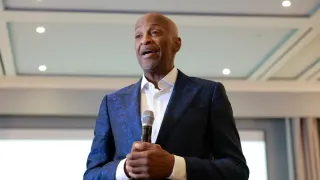November 5, 2019
Trump Plugs Son's Book While Accusing Bidens of Self-Dealing
Jill Colvin READ TIME: 3 MIN.
President Donald Trump has accused former Vice President Joe Biden of major ethical lapses and railed against Biden's son for allegedly profiting off his father's office.
But on Monday, Trump used his Twitter feed to publicize a new book by his eldest son, Donald Trump Jr., telling his 66.5 million followers that they should "Go order it today!"
"My son, @DonaldJTrumpJr is coming out with a new book, "Triggered: How the Left Thrives on Hate and Wants to Silence Us" - available tomorrow, November 5th!" Trump wrote on Monday, calling it a "great new book that I highly recommend for ALL to read."
That kind of promotional tweet would be a violation of ethics rules if it had come from any federal employee other than the president, said Liz Hempowicz, the director of public policy at the Project on Government Oversight, a nonpartisan government watchdog group.
"Frankly he's using his Twitter account to try to financially benefit his son," she said Monday. "That's not only distasteful, but it's a misuse of public office and it would be an official misuse of public office if it was anyone other than the president."
The tweet also highlights a well-practiced tactic of Trump trying to turn a weakness into an attack on his opponents.
In this case, Trump has zeroed in on Biden's son Hunter, going as far as to ask foreign governments, including Ukraine and China, to investigate the Biden family's business dealings. Those efforts helped spark the impeachment inquiry into his conduct.
Biden is a leading contender for the Democratic nomination and could face Trump in the general election next year.
"The Biden family was PAID OFF, pure and simple!" Trump insisted in a tweet last month, despite no evidence suggesting that the former vice president received any payments or that Hunter Biden did anything illegal. The younger Biden has acknowledged he displayed poor judgment when he took a post on the board of a Ukrainian energy firm, Burisma, after his father became the Obama administration's point person on U.S.-Ukraine relations.
Hunter Biden also recently said that he would step down from the board of directors of a Chinese-backed private equity firm because his service had become a "distraction."
Trump is repeating the playbook he used during his 2016 campaign, when he tried to paint his then-Democratic rival Hillary Clinton as corrupt and untrustworthy, mixing legitimate criticism of her past with unfounded conspiracy theories.
Trump is the first president in modern history who has failed to divest from his business holdings. He makes frequent trips to his for-profit golf clubs, continues to collect dues at his members-only properties, and hosts fundraisers and foreign delegations at hotels that bear his family's name.
And his sons continue to operate his company, at one point trying to launch a lower-budget hotel chain they hoped would appeal to Trump voters.
The White House did not respond to questions Monday. But a spokesman for Trump Jr. defended the tweet, insisting that there is little in common between a father promoting his son's book and a son being paid large sums of money by foreign companies because of his last name.
Trump Jr. has become the prime warmup act for his father, headlining events, appearing in interviews and drawing speculation about his own potential future in politics.
"Don had been a public figure for over a decade now and has spent that time building his own unique brand," said Trump Jr. spokesman Arthur Schwartz, adding that the president's son "got this book deal based on his own hard work and effort in becoming one of the most popular and sought after Republican figures in the country."
The Justice Department has argued that the president's tweets represent official statements from the White House.
Biden's campaign did not respond to a request for comment.
___






